大学英语Book 4 Unit 4教案
Unit 4 教案-新世纪大学英语第二册

Unit 4 Work and CareerLecturer: Cai Jie 蔡洁Classes: 注会11401 (53)Teaching Objectives:1.To understand the relationship among work, labor and play.2.Grasp the key words, phrases and structures.Teaching Contents1.Lead-in activities2.Text Organization (Text A)nguage points ( key words, phrases and difficult sentences)4.Grammar Focus (simple sentences and complex sentences)5.Guided Practice (Listening practice ,oral practice and written exercises) Teaching Focus3.Transformation of Sentencesage of language points and expressions5.Understanding of the textTime Allotment:Teaching Methods:●Explanation●Group discussion●Questions and answers●Multi-media●PerformanceTeaching Procedure:1.Warm-up Activity1) Group Discussion1.What do you think work can provide ?2.What factors do you think one should take into account when choosing a career?3.What kind of job do you think will be suitable for you?2) Quotes about work and labor.1 Work will not kill a man but worry will.累不死人愁死人。
新视野大学英语四unit4教案
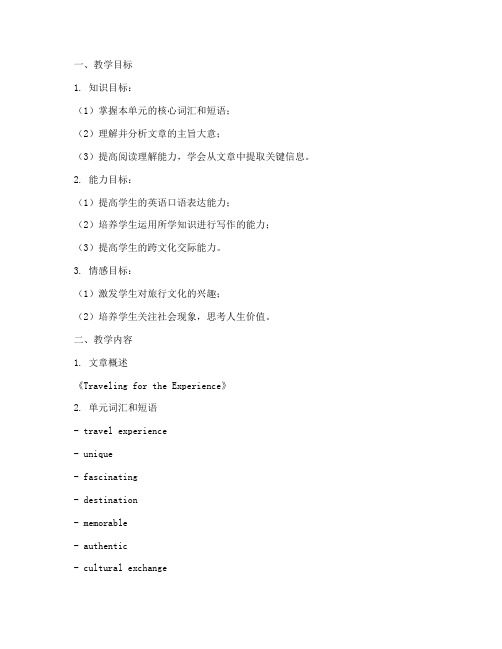
一、教学目标1. 知识目标:(1)掌握本单元的核心词汇和短语;(2)理解并分析文章的主旨大意;(3)提高阅读理解能力,学会从文章中提取关键信息。
2. 能力目标:(1)提高学生的英语口语表达能力;(2)培养学生运用所学知识进行写作的能力;(3)提高学生的跨文化交际能力。
3. 情感目标:(1)激发学生对旅行文化的兴趣;(2)培养学生关注社会现象,思考人生价值。
二、教学内容1. 文章概述《Traveling for the Experience》2. 单元词汇和短语- travel experience- unique- fascinating- destination- memorable- authentic- cultural exchange- fulfill- indispensable- unconventional3. 写作技能- 描述旅行经历- 表达个人观点- 举例说明三、教学过程1. 导入(1)通过提问,引导学生思考旅行的意义;(2)播放一段旅行视频,激发学生对旅行的兴趣。
2. 阅读理解(1)让学生快速阅读文章,了解文章大意;(2)引导学生分析文章结构,找出文章的主旨大意;(3)讲解文章中的重点词汇和短语,如travel experience、unique、fascinating等;(4)让学生回答问题,检验阅读效果。
3. 口语练习(1)分组讨论,让学生分享自己的旅行经历;(2)设置情景,让学生模拟旅行中的对话,如询问景点、介绍文化等;(3)教师点评,纠正学生的发音和语法错误。
4. 写作训练(1)布置写作任务,要求学生描述自己的旅行经历;(2)讲解写作技巧,如开头、结尾、过渡等;(3)学生完成写作,教师批改并点评。
5. 总结(1)回顾本单元所学内容,总结旅行的重要性;(2)鼓励学生在生活中多关注旅行文化,提高自己的综合素质。
四、教学评价1. 阅读理解:通过课堂提问和课后作业,检验学生对文章内容的掌握程度。
新视野大学英语第三版第三册Unit4教案
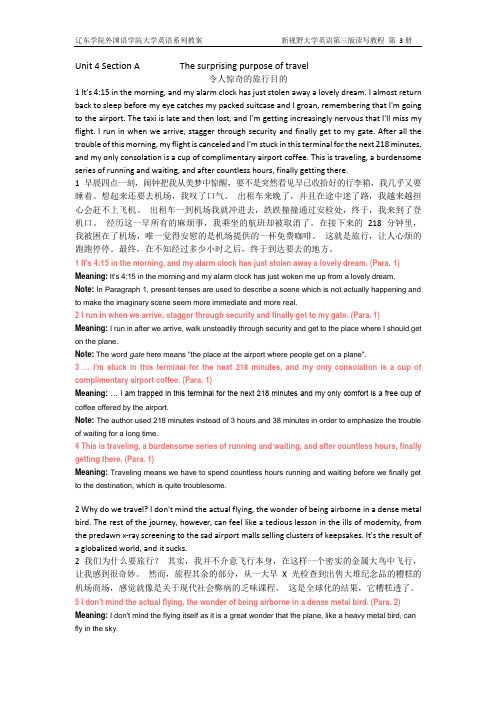
Unit 4 Section A The surprising purpose of travel令人惊奇的旅行目的1 It's 4:15 in the morning, and my alarm clock has just stolen away a lovely dream. I almost return back to sleep before my eye catches my packed suitcase and I groan, remembering that I'm going to the airport. The taxi is late and then lost, and I'm getting increasingly nervous that I'll miss my flight. I run in when we arrive, stagger through security and finally get to my gate. After all the trouble of this morning, my flight is canceled and I'm stuck in this terminal for the next 218 minutes, and my only consolation is a cup of complimentary airport coffee. This is traveling, a burdensome series of running and waiting, and after countless hours, finally getting there.1 早晨四点一刻,闹钟把我从美梦中惊醒,要不是突然看见早已收拾好的行李箱,我几乎又要睡着。
想起来还要去机场,我叹了口气。
全新版大学英语4教案
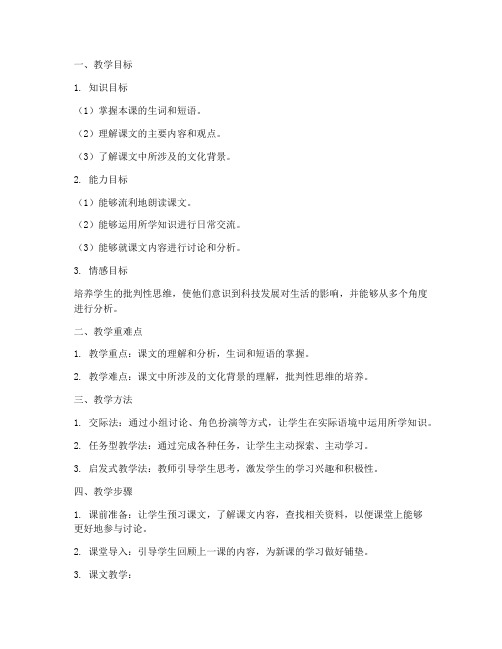
一、教学目标1. 知识目标(1)掌握本课的生词和短语。
(2)理解课文的主要内容和观点。
(3)了解课文中所涉及的文化背景。
2. 能力目标(1)能够流利地朗读课文。
(2)能够运用所学知识进行日常交流。
(3)能够就课文内容进行讨论和分析。
3. 情感目标培养学生的批判性思维,使他们意识到科技发展对生活的影响,并能够从多个角度进行分析。
二、教学重难点1. 教学重点:课文的理解和分析,生词和短语的掌握。
2. 教学难点:课文中所涉及的文化背景的理解,批判性思维的培养。
三、教学方法1. 交际法:通过小组讨论、角色扮演等方式,让学生在实际语境中运用所学知识。
2. 任务型教学法:通过完成各种任务,让学生主动探索、主动学习。
3. 启发式教学法:教师引导学生思考,激发学生的学习兴趣和积极性。
四、教学步骤1. 课前准备:让学生预习课文,了解课文内容,查找相关资料,以便课堂上能够更好地参与讨论。
2. 课堂导入:引导学生回顾上一课的内容,为新课的学习做好铺垫。
3. 课文教学:(1)让学生朗读课文,注意语音语调的准确性和流利度。
(2)讲解生词和短语,让学生能够正确理解和运用。
(3)分析课文内容,引导学生从多个角度理解课文观点。
4. 文化背景介绍:讲解课文中所涉及的文化背景,帮助学生更好地理解课文。
5. 课堂讨论:(1)分组讨论:让学生就课文内容进行分组讨论,分享自己的观点和看法。
(2)全班讨论:邀请学生就讨论结果进行分享,其他学生和教师进行评价和补充。
6. 任务完成:(1)分组任务:让学生分组完成与课文相关的任务,如编写对话、表演短剧等。
(2)全班展示:邀请学生就任务完成情况进行展示,其他学生和教师进行评价和反馈。
7. 课堂小结:对本课内容进行总结,强调重点和难点。
8. 课后作业:布置相关作业,巩固所学知识。
五、教学评价1. 课堂表现:观察学生在课堂上的参与程度、发言情况和表现。
2. 作业完成情况:检查学生作业的完成质量,了解学生对知识的掌握程度。
大学英语一课程讲义第四单元Unit4

Part I Get StartedSection A Discussion1. How did you feel about your parents when you were a child? Did your attitude towards them change when you grew into a teenager? Explain the change, if any.2. What is the greatest difficulty you have encountered in the process of growing up?3. “Only adolescents will like adolescents.” What do you think this statement means? Why do you think people say this? Do you agree?Section B Quotes⊙You have to do your own growing no matter how tall your grandfather was.⊙When I was a boy of fourteen, my father was so ignorant I could hardly stand to have the old man around. But when I got to be twenty-one, I was astonished at how much the old man had learned in seven years.⊙The day the child realizes that all adults are imperfect, he becomes an adolescent; the day he forgives them, he becomes an adult; the day he forgives himself, he becomes wise.Part II Read and ExploreSection A: Fill in the blanks with relevant information from the text about changes in the writer’s attitude towards his father.1)When he was a child, the writer .2)When he was a teenager, the writer3)After the car accident, the writer ___Section B Key Words and Expressions for Text A (主要为中英互译练习)Para.1 settle in/into sth.get used to (new surroundings, a new job, etc.) 习惯于(新环境、新工作等)e.g. It didn’t take her long to settle into a new routine.英译汉:We only moved house last week and we haven’t settled in yet.NB: settle (sb.) in/into sth. 在这个短语中,动词settle后也可以加宾语;介词into和in可以互换,例如:We settled the children in/into new schools when we moved to London.Para. 2 beam:1. v./n.1) smile brightly and happily 笑,眉开眼笑试翻译如下例句(注意beam后面介词的不同):(1)Maggie beamed at her friend with admiration.(2)He beamed on his visitors.(3)The old lady opened the door with a beam.查一查:通过查词典,看看beam还有什么常用的意思?Para.9 enroll: v.[(as, in)] make (oneself or another person) officially a member of a group [常与as或in连用]吸收(某人)为成员;(使)入会(入学,入伍);登记,注册e.g. 1. We enrolled him as a member of the society.我们吸收他为会员。
新视野大学英语第三版unit4教案
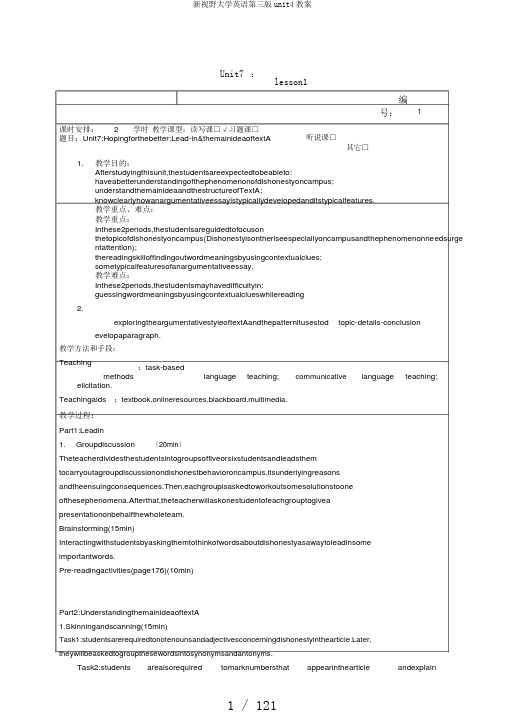
Unit7:lesson1编号:1课时安排:2学时教学课型:读写课□√习题课□题目:Unit7:Hopingforthebetter:Lead-in&themainideaoftextA听说课□其它□1.教学目的:Afterstudyingthisunit,thestudentsareexpectedtobeableto:haveabetterunderstandingofthephenomenonofdishonestyoncampus;understandthemainideaandthestructureofTextA;knowclearlyhowanargumentativeessayistypicallydevelopedanditstypicalfeatures.教学重点、难点:教学重点:Inthese2periods,thestudentsareguidedtofocusonthetopicofdishonestyoncampus(Dishonestyisontheriseespeciallyoncampusandthephenomenonneedsurge ntattention);thereadingskilloffindingoutwordmeaningsbyusingcontextualclues;sometypicalfeaturesofanargumentativeessay.教学难点:Inthese2periods,thestudentsmayhavedifficultyin:guessingwordmeaningsbyusingcontextualclueswhilereading2.exploringtheargumentativestyleoftextAandthepatternitusestodevelopaparagraph.topic-details-conclusion教学方法和手段:Teachingmethods :task-basedlanguage teaching;communicative language teaching;elicitation.Teachingaids:textbook,onlineresources,blackboard,multimedia.教学过程:Part1:Leadin1.Groupdiscussion〔20min〕Theteacherdividesthestudentsintogroupsoffiveorsixstudentsandleadsthem tocarryoutagroupdiscussionondishonestbehavioroncampus,itsunderlyingreasons andtheensuingconsequences.Then,eachgroupisaskedtoworkoutsomesolutionstoone ofthesephenomena.Afterthat,theteacherwillaskonestudentofeachgrouptogivea presentationonbehalfthewholeteam.Brainstorming(15min) Interactingwithstudentsbyaskingthemtothinkofwordsaboutdishonestyasawaytoleadinsome importantwords.Pre-readingactivities(page176)(10min)Part2:UnderstandingthemainideaoftextA1.Skinningandscanning(15min)Task1:ter, theywillbeaskedtogroupthesewordsintosynonymsandantonyms.Task2:students arealsorequired tomarknumbersthat appearinthearticle andexplainwhytheyareused.prehensionQs(page183)(15min)Part3Stylisticanalysis(15min)Concerning the writing style,t he students are guided to realize Text Ais an argumentative essay. Withregard toanargumentative essay, they shouldknowthewholetext centers onatopic andconcerning thetopic thewriter definitely hashis standpoint.Then concerningeachpartandeachparagraph,thestudentsareguidedtodiscoverthattheregenerallyisatopicsentence/statementsupportedbydetails(examplesinparticularinTextA)andaconcludingsentence/statement.板书设计:Unit7HopingforthebetterPart1.LeadinGroupdiscussionBrainstormingPre-readingactivitiesSkinningandscanningComprehensionQsPart3.Stylisticanalysis讨论、思考题、作业:PreviewthenewwordsandexpressionsoftextA;UtilizingtheinternetandgettoknowsomelifeexperiencesofAbrahamLincoln.Unit7:lesson2编号:2课时安排:2学时教学课型:读写课□√题目:Whenhonestydisappears:detailedstudyoftextA习题课□听说课□其它□教学目的:Afterstudyingthisunit,thestudentsareexpectedtobeableto:summarizethemainideaofTextA;understandthekeywords,phrases&expressions,andsentencestructures.教学重点、难点:教学重点:Inthese2periods,thestudentsareguidedtofocuson1.Keywords:eliminate;reveal;accurate;facilitate;exaggerate;imply;launch;frustrate;conscious;appropriate;expel;exemplify;extensive;awareness;etc.2.Phrases&expressions:launchacampaign;ifthis/thatisthe case;be confinedto;ripoff;descend to;turn in;copewith;nottomention;makeacomplaintaboutsth.;etc.3.Sentencestructures:Especially troubling/surprising/annoying are thereports/facts that.;Sth.,once hailedassth.,couldbecomesth.;Whetherdiscoveredornot(whetherconsciousorunconscious),sth.willdoaneffectonsth.;etc.教学难点:Inthese2periods,thestudentsmayhavedifficultyin:understandingthemainideaandstructureofTextA;; understandingandtranslatingsomecomplexsentences:教学方法和手段:Teaching methods:grammar translation teaching;communicative language teaching;elicitation.Teachingaids:textbook,onlineresources,blackboard,andmultimedia.教学过程:Part1Languagepoints(45min)Keywords:eliminatevt.1getridofsth.thatisnotwantedorneeded消除;剔除;铲除Wearetakingallmeasureswithinourpowertoeliminateviolence.我们正在采取我们力所能及的一切措施来消除暴力。
新视野大学英语视听说教案第三版第4册
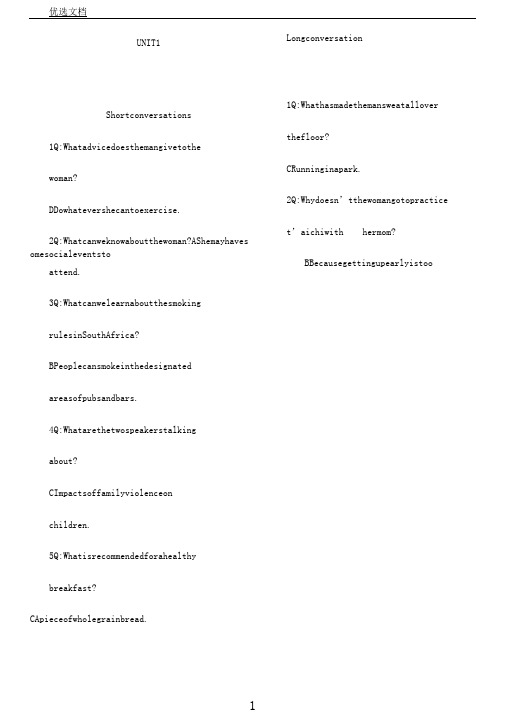
UNIT1Shortconversations1Q:Whatadvicedoesthemangivetothewoman?DDowhatevershecantoexercise.2Q:Whatcanweknowaboutthewoman?AShemayhaves omesocialeventstoattend.3Q:WhatcanwelearnaboutthesmokingrulesinSouthAfrica?BPeoplecansmokeinthedesignatedareasofpubsandbars.4Q:Whatarethetwospeakerstalkingabout?CImpactsoffamilyviolenceonchildren.5Q:Whatisrecommendedforahealthybreakfast?CApieceofwholegrainbread. Longconversation1Q:Whathasmadethemansweatallover thefloor?CRunninginapark.2Q:Whydoesn’tthewomangotopractice t’aichiwith hermom?BBecausegettingupearlyistoodifficultforher.3Q:Whatdoesthewomannormallydoonweekends?DSittingbeforehercomputer.4Q:Whydoesthemansuggestthewomangetazoomembership?AForexercise like jogging inthezoo.Passage11Q:Whattasks doesthespeakertendtodofirsteveryday?AThequicktasks.2Q:Howtoworkmoreefficiently accordingtothespeaker?CMakeuseofyourmostproductive timeofday.3Q:Howdoesthespeakerdealwithemailsnow?DHeopenshisinboxonlywhenit ’snecessary.4Q:Whatisthepurposeofthetalk? CTogivesometipsonhowtomanage time.Passage22)distressing3)desperate4)urge5)acquire6)aretotallyunawareofareisolatedfromaffirminteractwithimpulseareconvincedofUNIT2Shortconversations1Q:Whatarethetwospeakerstalkingabout?AWhatthemanwill doafter graduation .2Q:WhatdoesthewomanthinkofLinda?DShelooksyoungerthansheis.3Q:Whatmakesthewomanafraid ofgettingold?CLackofsomeonetodependon.4Q:Whatdoesthemanlike bestaboutbeinginhisearly20s?BHavingplentyofopportunities.5Q:Whatdoesthemansayaboutagediscrimination?DPeoplemayhavedifferentopinionsonthecourtd ecisions.Longconversation1Q:Whatarethetwospeakerstalk ingabout?CWhattowishforinlife.2Q:According totheman,whyistrueloveimportantforahappylife?BItmakescouplesappreciateeach other.3Q:Whatdifficultiesdidtheman experienceinhislife?AHelost hisjobandhouseandwassick foryears.4Q:Whatisthemandoinginthetalk? DGivingthewomanadviceonimportant thingsinlife.Passage11Q:InwhatwayaretheAdventists differentfromordinarypeople? BTheylivetheirwholelivesina mountain.2Q:HowmuchlongerdoAdventistwomen expecttolivethanotherCalifornian women?CAboutthreeyears.3Q:Whatischaracteristicofthe Adventists’diet? DItishighinfruit,vegetablesand wholegrains.4Q:Whatisthemainideaofthepassage? ADietandlifestyle arecrucial togood health.Passage2proportion2)estimatedhaveprofoundimpactsonpotentialeconomicallypensionsoriginatefromresidentialposesachallengetobetransformedintoUNIT3Shortconversations1Q:Whatisthewomangoing todoover the semesterbreak? DGoingcampingwithfriends.2Q:Whydidthewomanquitherswimminglessons?DBecauseshecouldn’tfit twoprogramsintoherschedule. 3Q:Whydoesn’tthewomanwanttoleaveonFriday?CBecauseshewillhaveavisitor.4Q:Whatdoesthewomansuggestthemanbringforthecampingtriptothepark?BWarmclothes.5Q:Whatwill thewomanprobably dobeforethevacation?AConfirmherhotelreservation.Longconversation1Q:WhatmakesBigSkyParkanice vacationplaceforthecouple? DIthasnicepathsandcampingsites.2Q:Howcanthecouplegetall theircampingstuffonthebus?DByusingboththeir cart andbackpack. 3Q:Whatwill thewomanprobably dobefore theirtrip?BBakeachocolatecake.4Q:Whatdoesthecouplelong todo atthe park?CWalktogether inthebeautyofnature.Passage11Q:Whyshouldvisitors behurried if theywanttoseetheexhibitsinthenewmuseum inColombia’scapital? BBecausetheexhibitionwilllastfor nomorethanaweek..2Q:Whatareexhibitedinthenewmuseum?CBedsandsofasthatyoucantryout.3Q:Whatisthepurposeoftheexhibition?AIt provides apractical experienceforustothinkaboutlaziness.4Q:Whatdidthemuseum’sfounderadviseusto do?CSitdown,relaxandbelazyforawhile.Passage2resortssprungupdramaticallyhavinganadverseeffectoncombatwildernessunspoiledstreamsofguidelinesauctionoffUNIT4Shortconversations1Q:Whatdoesthemanthink thegovernment coulddo?C.Providefinancialhelpforhomeless people.2Q:Whatdoesthemansuggesttochangethesituation?A.Holdingsomesocialactivities. 3Q:Whatdoesthemansuggestthewomando?ethesubwaytoavoidheavytraffic.4Q:Whatdoesthemanthinkweallshould do?C.Extendahelpinghandandgivelove topoorpeople.5Q:Whatarethetwospeakerstalking about?D.Howtoreuseitemstoliveagreenlife.Longconversation1Q:Whydoesthemanlookupset?B.Becausehehastoomuchworkto complete.2Q:Howdoesthewomansayshecanhelpthe man?A.Tohelphimdohisworkinherfreetime.3Q:Whatadvicedoesthewomangivetotheman?B.Heshouldhaveconfidence inhimself. 4Q:Whyistherestaurantcalled365?D.Becauseitoffersseasonalfoods.Passage11Q:Whatnegativeeffectcanbecausedby workers’discontent?A.Lessinnovationefforts.2Q:WhatpercentageofAmericanworkersare satisfiedwiththeirjobsasfoundbythe survey?D.percent.3Q:Whyisit thatpeopleaged 25to34aremostsatisfiedwiththeirjobs?D.Becausetheyseemoreopportunitiesforpromotionasbabyboomersretire.4Q:Whatcanweconcludeaboutthereasonsb ehindjobdissatisfaction?C.Thereasonsforjobdissatisfactionarefoundt obevarious.Passage2prevalentscarybeclassifiedasepidemicratiodiagnosedkeepingtrackofwasstillassociatedwithaffirmintermsofUNIT5Shortconversations1Q:Whatdoesthemansayaboutthesinger?CHermusicstyleisunique.2Q:Whatarethetwospeakersmainlytalkingabout? DWhattodoontheirtourofRome.3Q:What’stheman’sareaofstudy?BModernopera.4Q:Howlongdoestheexhibitopenon Saturdays?C7hours.5Q:Whatisspecialaboutthemovie?DTheactorsremainsilentthroughoutit.Longconversation1Q:Whatisthewoman’simpressionofSan Francis cowhenvisitingthistime?BShefindsmanysitesstayunchanged.2Q:WhatdoesthewomansuggesttheydobeforegoingtotheGoldenGateBridge?DViewingthebridgefromahill.3Q:Whatdoesthemanwanttodo?CEatbeforecontinuingtheirtour.4Q:Whatdoesthewomanconsider tobethebestwaytoenjoyculture?ATotrulyexperienceitinnorush.Passage11Q:WhoisthepersonpaintedintheMonaLisa?CThewifeofawealthymerchant.2Q:Whatmadeit possible fortheMonaLisa tosurviveforcenturies?ATheuseofawoodpanel. 3Q:Whatismentionedasoneofthetechniques usedforpainting theMonaLisa? DDrawingthesubjectwithaccuratedetails.4Q:Whatdoesthepassagemainlydiscuss?BThereasonsforthefameoftheMonaLisa.Passage2 anticipationglamorous beconferredupon collectivenominatefor exceptionstoaccomplished absoluterecipients2)isentitledto CItisbringingfamiliescloser.Longconversation1Q:Whyisthesonrequired toturn off hiscomputerwhilehisfatherisnot? CBecausethefather ismeetingwithhis colleaguesonline.2Q:Why doesn’tthesonwanttoturnoff hiscellphone? DBecausehewantstocheckthenews aboutagolfplayer.3Q:Whatrule doesthemotherdecidetoset forthefamily? AHavingdinnerwithoutanyUNIT6Shortconversations electronics.4Q:Whatcanwelearnfromthe conversation?CElectronicssometimescausefamilyQ:Whatdoesthemanthinkoftoday’snewspapers?disagreements.BTheyaredisappointing.Passage1 Q:Whatisthewomanprobablydoing?AHostingaradioprogram.1Q:WhyiscelebritynewsprevalentinQ:Whatdoesthemansayaboutrealityourmedia? TV?BItmakesviewersfeelsuperior.DBecauseitgivesusabreakfromthe Q:Howdoyoungpeoplesocializetodayharshrealities.accordingtotheman?2Q:Whatcanwelearnaboutcelebrities DBycommunicatingontheInternet.fromtheconversation?Q:WhatdoesthemanthinkofmodernCTheydotheirutmosttogain communicationstechnology?attention.3Q:Whyarecelebrities’lifestylesattractivetopeople?DBecausetheycontainthingsdesiredbycommo npeople.4Q:Whatshouldwekeepinmindwhenwatchingorrea dingcelebritynews?BCelebrities’livesaresimilartothoseofcomm onpeople.Passage2differentiatethemselvesfromfrownuponconcisecombatsevereisgearedupforembracedcompactissupplementedwithsensationalUNIT7Shortconversations 1Q:Whatistheproblemwithdriving schools? BTheyneedmoresupervisionoverthe highchargesandbribes.2Q:Whatcanwelearnfromthe conversation?AMorefoodassistanceprogramsareneededforill nourishedpeople.3Q:Whatdoesthemanexpecthisreportonoldpeopl ewillachieve?CHelppeoplechangetheirunderstandingandfeel ingsaboutoldage.4Q:Whatcanwelearnfromthemanabouttheissueof climatechange?BGovernmentsshouldcooperatemoretosolvetheproblem.5Q:Whatisimplied inthewoman’swords?DSheoftengivesupwhatshetriestodo.Longconversation1Q:Whatwill thecoupledo toprepareforthestorm?DGotoastoretogetmoreemergencyitems.2Q:Whatthingsdotheyhaveathomeforemergencysituations?BFlashlightsandcash.3Q:Whydoesthewomansuggesttheybringcashwiththem?DBecausethecreditcardmachinesmaynotworkproperly. 4Q:What’stheir budgetfor clothing everymonth?A$200.Passage11Q:Whatproblemiscommonlyfacedbyretailbusinesses?BThestealingofretailitemsfrom theirstoresbythieves.2Q:Whatmayretailersdotocompensateforth elossescausedbyshoplifting?ASell goodsathigher prices thantheynormallydo.3Q:Accordingtothespeaker,whocanusuallybetterabsorbthelosses causedbyshoplifting?DLargerretailers.4Q:Whatpreventionmethodagainstshopliftingismentionedbythespeaker?CPutting security devicesonproducts.Passage2motivationshazarddevelopanappetiteforassociatedwithcontributetofollowsuitconsensusauthorities inadequaciesexaggerationureUNIT8Shortconversations1Q:Whatdoesthewomansayaboutgoodnovels?DTheyenablereaderstohavedifferentexperi ences.2Q:Whydoesthewomanlikegoingtoabookclub?CBecauseshecanmeetpeoplewithsimilar interests.3Q:Whatarethetwospeakerscomplaining about?BPeopletodayaretoodistractedandread little.4Q:Whatdoesthewomanimply?AShedoesn’tdomuchreadingtoherchildren.5Q:Whatisanimportantfeatureofaclassicnovelaccordingtotheman?CItremainspopularallthetime..Longconversation1Q:Whatdoesthemanwanttoknowaboutthesong “StarryStarryNight”?BThewriterofthesong.2Q:WhydidDonMcLeanwritethesong?CToshowhisrespectforVanGogh.3Q:WhatcanwelearnaboutVanGoghfromtheconversation?AHewasn’tpopularduringhis lifetime.4Q:WhatdidVanGoghandDonMcleanhaveincommon?DTheybothshowedpersistenceintheirpursuitofart.10)virtuallyPassage11Q:WhatdoestheprogramofReadingRecoveryintendtodo?ATohelpfirst-gradestudentsovercomereadingproblems.2Q:HowdoteachersintheReadingRecoveryprogramteach?CTheyhelpstudentsfindthebestwaytolearn.3Q:WhenwillstudentsstoptakingReadingRecoverylessons?BWhentheyhavereachedtheaverageleveloftheclass.4Q:Whatisconsideredbysomecriticsasadisadvantageoftheprogram?DItcostsmorethanotherprograms.Passage2refugeedesperateentitledbecameinformedofareconfrontedwithspokespersonseekoutprofiles1)stayedloyalto。
新标准大学英语综合教程4_
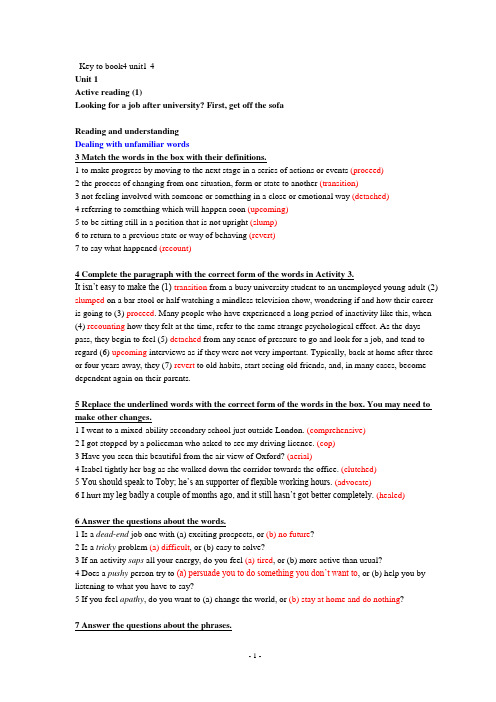
Key to book4 unit1-4Unit 1Active reading (1)Looking for a job after university? First, get off the sofaReading and understandingDealing with unfamiliar words3 Match the words in the box with their definitions.1 to make progress by moving to the next stage in a series of actions or events (proceed)2 the process of changing from one situation, form or state to another (transition)3 not feeling involved with someone or something in a close or emotional way (detached)4 referring to something which will happen soon (upcoming)5 to be sitting still in a position that is not upright (slump)6 to return to a previous state or way of behaving (revert)7 to say what happened (recount)4 Complete the paragraph with the correct form of the words in Activity 3.It isn‘t easy to make the (1) transition from a busy university student to an unemployed young adult (2) slumped on a bar stool or half watching a mindless television show, wondering if and how their career is going to (3) proceed. Many people who have experienced a long period of inactivity like this, when (4) recounting how they felt at the time, refer to the same strange psychological effect. As the days pass, they begin to feel (5) detached from any sense of pressure to go and look for a job, and tend to regard (6) upcoming interviews as if they were not very important. Typically, back at home after three or four years away, they (7) revert to old habits, start seeing old friends, and, in many cases, become dependent again on their parents.5 Replace the underlined words with the correct form of the words in the box. You may need to make other changes.1 I went to a mixed-ability secondary school just outside London. (comprehensive)2 I got stopped by a policeman who asked to see my driving licence. (cop)3 Have you seen this beautiful from the air view of Oxford? (aerial)4 Isabel tightly her bag as she walked down the corridor towards the office. (clutched)5 You should speak to Toby; he‘s an supporter of flexible working hours. (advocate)6 I hurt my leg badly a couple of months ago, and it still hasn‘t got better completely. (healed)6 Answer the questions about the words.1 Is a dead-end job one with (a) exciting prospects, or (b) no future?2 Is a tricky problem (a) difficult, or (b) easy to solve?3 If an activity saps all your energy, do you feel (a) tired, or (b) more active than usual?4 Does a pushy person try to (a) persuade you to do something you don‘t want to, or (b) help you by listening to what you have to say?5 If you feel apathy, do you want to (a) change the world, or (b) stay at home and do nothing?7 Answer the questions about the phrases.1 Is fork out (a) a formal, or (b) an informal way of saying to pay for something?2 If you are in the same boat as another person, are you (a) making the same journey together, or (b) in the same difficult or unpleasant situation?3 If you feel you have come full circle, do you (a) feel you are back where you started, or (b) feel a sense of satisfaction because you have completed something?4 If someone takes a soft line, do they deal with a person (a) in a kind and sympathetic way, or (b) in a lazy way without making a decision?5 If you strike the right note about something, are you expressing yourself (a) well, or (b) badly?6 If you do something by all means, do you (a) try your best to do it, or (b) not care about it?7 If you nudge someone back into the saddle, are you encouraging them to (a) take responsibility again, or (b) take it easy?8 If you talk through a problem with someone, do you (a) examine it carefully and sensitively, or (b) refer to it quickly and then change the subject?Active reading (2)If you ask meDealing with unfamiliar words4 Match the words in the box with their definitions.1 funny or entertaining (amusing)2 used for emphasizing that something good has happened, especially because of good luck (fortunately)3 an amount of money that a person, business or country borrows, usually from a bank (loan)4 to take an amount or number from a total (deduct)5 the most exciting, impressive, or interesting part of an event (highlight)6 to show that you understand someone‘s problems (sympathize)7 needing a lot of time, ability, and energy (demanding)5 Complete the conversation with the correct form of the words in Activity 4.A After three years at university, I‘m now quite heavily in debt.B I (1) sympathize with you, I know what it‘s like to have financial problems. But (2) fortunately I didn‘t need to take out a student (3) loan when I was at university, because I had a part-time job.A What did you do?B I worked in a restaurant at weekends.A That must have been very (4) demanding.B Yes, it was. I had to get the right balance between work and study. But the other people who worked there were good fun to be with, so it was quite (5) amusing too. The (6) highlight of the weekend was always Saturday night when we worked overtime.A But I don‘t expect you made a lot of money?B No, there wasn‘t much after they‘d (7) deducted tax and pension contributions. But it was enough to keep me going.6 Replace the underlined words with the correct form of the words in the box. You may need to make other changes.1 When I was at college I kept all my personal things in an old cupboard.2 A lot of people who leave university before getting a degree end up in good jobs.3 I think she‘ll get a good degree, but I wouldn‘t risk my money on the exact result.4 The money I spent at college was more than what I earned in my part-time job.5 The chances of my being offered a job after that interview must be quite remote.6 Our business has done very well since we changed our advertising.7 I think telling the truth and not cheating is always the best policy.Key:(1) belongings (2) dropouts (3) gamble (4) exceeded (5) odds(6) has thrived (7) honesty7 Answer the questions about the words and expressions.1 If something is not all it’s cracked up to be, is it (a) valid and interesting, or (b) just a little bit disappointing?2 If someone keeps banging on about something, are you likely to be (a) interested in, or (b) bored by what they say?3 If there is a lot of hassle in your life, are you likely to feel (a) stressed, or (b) relaxed?4 If something happens out of the blue, is it (a) unexpected, or (b) part of your plan?5 If you say you ended up in a particular job, do you suggest that (a) you have fulfilled your ambition, or (b) it happened almost by chance?6 Are the regulars in a pub (a) the customers who come very often, or (b) the food the pub offers most often?7 If something is dead easy, is it (a) very easy, or (b) not easy at all?8 If you treat someone to something, do you (a) buy something nice for them, or (b) behave badly to them?9 If you cheer a place up, do you (a) make the place look brighter, or (b) make the people in the place happier?Reading and interpreting8 Look at the sentences from the passage and identify the style features.1 Twelve years at school and three years at university, teachers banging on about opportunities in the big wide world beyond our sheltered life as students, and what do I find?This shows the informality of an incomplete sentence in the first part, the use of an informal expression (banging on) and a rhetorical question to the reader (What do I find?)2 Try as I might to stay cheerful, all I ever get is hassle, sometimes with people (especially boys, god, when will they grow up?) …This has the use of an informal word (hassle), an informal exclamation (god) and a question to the reader (When will they grow up?)3 Actually, I had my eye on the course at the London School of Economics (LSE).Here there is a discourse marker typical of speech (Actually) and an informal phrase (had my eye on).4 I kind of understand it, and not just because my degree is in economics.Here ―kind of‖ is a sort of discours e marker of informal speech (showing something is general, vague or not definite).5 I wanted something in finance and investments, because you know, maybe with a job like that, Icould use my degree.This has a discourse marker of informal speech (you know).6 ... it‘s true, he really did seem to have three hands.Again here is a discourse marker of informal speech (it‘s true).7 I talked to him about ... well, about pretty well everything …This has another discourse marker of informal speech (well) and an informal phrase (pretty well). Language in useword formation: compound nouns1 Write the compound nouns which mean:1 a degree which is awarded a first class (a first-class degree)2 work in a hospital (hospital work)3 a ticket for a plane journey (a plane ticket)4 a discount for students (a student discount)5 a pass which allows you to travel on buses (a bus pass)6 a room where an interview is held (an interview room)7 a period spent in training (a training period)word formation: noun phrases2 Write the noun phrases which mean:1 a career which is rewarding from the financial point of view (a financially rewarding career)2 legislation which has been introduced recently (recently introduced legislation)3 instructions which are more complex than usual (unusually complex instructions)4 an institution which is orientated towards academic (academically orientated work)5 work which makes physical demands on you (physically demanding work)6 information which has the potential to be important (potentially important information)7 candidates who have been selected after a careful procedure (carefully selected candidates)8 a coursebook in which everything has been planned beautifully (a beautifully planned textbook)try as … might3 Rewrite the sen tences using try as … might .1 I‘m trying to fill this last page, but I just can‘t think of anything.Try as I might to fill this last page, I just can‘t think of anything.2 I try to be friendly with Marta, but she doesn‘t seem to respond.Try as I might to be friendly with Marta, she doesn‘t seem to respond.3 I try hard to get to sleep, but I can‘t help thinking about my family.Try as I might to get to sleep, I can‘t help thinking about my family.4 He just doesn‘t seem to get the promotion he deserves, even though he keeps trying.Try as he might, he just doesn‘t seem to get the promotion he deserves. / Try as he might to get the promotion he deserves, he just doesn‘t seem to get it.5 I keep trying to remember her name, but my mind is a blank.Try as I might to remember her name, my mind is a blank.given that …4 Rewrite the sentences using given that …1 Since I know several languages, I thought I would look for work abroad.Given that I know several languages, I thought I would look for work abroad.2 Xiao Li has the best qualifications, so she should get the job.Given that Xiao Li has the best qualifications, she should get the job.3 Since we‘re all here, I think it would be a good idea to get down to some work.Given that we‘re all here, I think it would be a good idea to get down to some work.4 Since it‘s rather late, I think we should leave this last task until tomorrow.Given that it‘s rather late, I think we should leave this last task until tomorrow.clauses introduced by than5 Rewrite the sentences using clauses introduced by than .1 She‘s experienced at giving advice. I‘m more experienced.She‘s less experienced at giving advice than I am. / I‘m more experienced at giving advice than she is.2 You eat too much chocolate. It isn‘t good f or you.You eat too much chocolate than is good for you.3 She worked very hard. Most part-timers don‘t work so hard.She worked harder than most part-timers do.4 You have arrived late too many times. That isn‘t acceptable.You have arrived late more times than is acceptable.5 I don‘t think you should have given so much personal information. It isn‘t wise.I think you have given more personal information than is wise.collocations6 Read the explanations of the words. Answer the questions.1 highlight A highlight is the most exciting, impressive, or interesting part of an event.(a) What would you like to be the highlight of your career?I would like the highlight of my student career to be to receive a national award for the best student research project.(b) How can you highlight an important sentence in a text?You can underline it in pencil or pen or you can use coloured pens or highlighters.(c) What are the edited highlights of a football match?The highlights are when someone scores a goal or prevents one from being scored.2 loan A loan is an amount of money someone borrows from someone else.(a) Have you ever taken out a loan?No, I haven‘t. But my parents have taken out several loans to buy kitchen equipment.(b) What is the best way to pay off a loan?It is best to pay a loan off quickly, although you will still have to pay some interest.(c) If you have a library book on loan, what do you have to do with it?You have to return it before the date it is due, otherwise you may have to pay a fine.3 thrive To thrive means to be very successful, happy or healthy.(a) What sort of business thrives best in your part of the country?In my part of the country, light industries and electronics companies thrive.(b) Which sort of plants thrive in a hot climate?In a hot climate you can see tropical fruit and vegetables thrive and also tropical plants and trees. (c) Why do you think some couples thrive on conflict?It is difficult to understand why some couples thrive on conflict. Maybe each one wants to compete with the other or maybe they enjoy ―kissing and making up‖ after the conflict.7 Translate the paragraphs into Chinese.If you ask me, real life is not all it‘s cracked up to be. Twelve years at school and three years at university, teachers banging on about opportunities in the big wide world beyond our sheltered life as students, and what do I find?Try as I might to stay cheerful, all I ever get is hassle, sometimes with people (especially boys, god, when will they grow up?), but mostly with money. It‘s just so expensive out here! Everyone wants a slice off you. The Inland Revenue wants to deduct income tax, the bank manager wants repayments on my student loan, the landlord wants the rent, gas, water, electricity and my mobile bills keep coming in, a nd all that‘s before I‘ve had anything to eat. And then some bright spark calls me out of the blue, asking if I‘m interested in buying a pension. At this rate, I won‘t even last till the end of the year, let alone till I‘m 60.(☞翻译时可以根据上下文增译,即增加原文暗含了但没有直接表达出来的意思。
新视野大学英语4第三版第四册第四单元教案
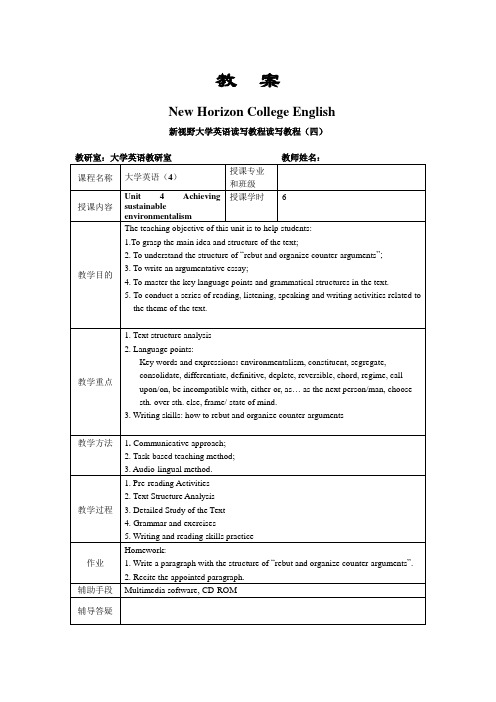
学生按英语水平的不同进行了划分。
3. consolidate
v. a)combine things in order to make them more effective or easier to deal with.
be completely different fromwhatyou feel is right,natural, or normal for you
His music generally runs against the grain of what is modern.
他的音乐总体上和现代音乐格格不入。
No longer is he able to differentiate between fantasy and reality.
他不能区分虚幻和现实。
6. costless a.
not costing anything
The internet provides us a costless way of sharing.
Part I (paras. 1):Introduction to environmental protection.
Part II (paras.2-10):Body: rules oห้องสมุดไป่ตู้environmental protection.
Part III (paras.11-13):Conclusion: nature should be subordinate to human beings.
由联合国教科文组织部分出资赞助的这一项目期限是12个月。
新思路大学英语基础教程第一册(第二版)教案unit4

For example:part-time jobs, volunteer work, sports, student club activities, reading,etc.
2)In the first question, if your answer is “YES”, could you please share your experience andwhat have you got from your extracurricularactivities?
5 mins
Conversation
1.Pre-listening
Step 1
Introduce the background information aboutNational Fitness dayby showing the pictures.
Step 2
Pronounce the new vocabulary and key sentences for the class to repeat and explain some of difficulties.
Step4Teacherasks students to read the new words in the conversation according to thephonetic symbolslearned above.
14 mins
Homework
1) Studentsfurther explore their after-class activities and share it with their partner.
5 mins
大学英语综合教程4unitPPT课件

01
Unit Introduction
Unit Theme
Summary
Unit Theme Introduction
Detailed description
The theme of this unit is "Global Climate Change", which mainly explores the current situation, causes and impacts of global climate change, as well as individual and social response strategies.
Teaching objectives
Summary
Explanation of teaching objectives
Detailed description
The teaching objectives of this unit include: cultivating students' reading comprehension ability, enabling them to master vocabulary and expressions related to global climate change, understanding the scientific principles of global climate change, and improving their critical thinking ability and environmental awareness.
新标准大学英语4 B4U4教案

Unit 4 Money TalksSection 1 Lead-inActivity 1 How do banks work?1. Do you know how banks make money? First have a discussion with your partners and describe briefly about the way banks make money. The following are some possibly involved words.deposit 存款savings account储蓄帐户interest rate利息率loan贷款margin / difference 差额2. Now listen carefully and do the compound dictation.This is financial adviser Patrick Munro talking about, “How do banks work?” Banks are designed as community service organizations; however they are private businesses and they’re designed to make a profit. What banks do is they take in what’s called deposits. In other words when you have a paycheck and take it to the bank for safety purposes, you can deposit that money with the bank. The bank will pay you an interest rate, lower on a savings account, even lower on a checking account. But they have now got the deposit in their portfolio (投资组合).What they will then do is turn around and lend money out at a higher interest rate through things such as mortgages (抵押), credit cards, car loans and various other financial instruments that are debt related. Banks work on what's called a margin. So what they pay you, for instance two percent on your cash accounts, and lend out and auto loan at seven percent, the bank will make the difference, which is five percent. So banks can become very profitable in a short period of time. This is Patrick Munro talking about how do banks work.Activity 2Share your favorite money quotes and use examples or personal experience to support your choice.Example1. Money is the root of all evil.2. Look after the pennies and the pounds will look after themselves.3. Whoever said money can’t buy happiness didn’t know where to go shopping.Suggested answer:1. Money is the root of all evil.→Money is behind the crimes & wrong-doings in the world, for example, bank robberies and murders with a financial motive2.Look after the pennies and the pounds will look after themselves.→taking care of your spending & saving moneyIf you are careful about small details, e.g.small amounts of money, the larger amounts of money will not need much attention (they will look after themselves)3. Whoever said money can’t buy happiness didn’t know where to go shopping.→If you know where to go shopping, you can, in fact, buy happiness.You have to search for the right place. But it seems that many people do not know where this is. Activity 3 Bank credit ratingDo the quiz on P50 to find whether you are a good customer to banks.Mostly (a)s: Medium You’ve probably never been inside a bank in your life, but sooner or later you’ll have to – and they’ll be looking to try and make you change your lifestyle. A word of advice, though, don’t believe everything they tell you!Mostly (b)s: Low You’re a cautious customer, but you’re a practical person too. The banks won’t make a lot of money out of you!Mostly (c)s: High You’re just the sort of customer the banks are looking for. They like people who spend money without thinking about the consequences! You are welcomed to use their credit card. Activity 4 Introduction of credit cardsListen to a recording & complete the summary.A credit card allows you to 1) charge something immediately and then pay for the bill for at a 2) later date. Once a credit card has been issued, you can make purchases within the prescribed credit 3) limit . A credit card with a limit of $100.00 enables you to pay for up to 4) $100.00 worth of items. Every month, you will receive credit card 5) statements that lists the charges you have made. You have to pay your bill in full by the 6) due date. Otherwise, you have to pay 7) interest or a 8) finance charge. ScriptCredit cards are an important part of American life. Whether we have a positive or negative image of credit cards, they are an inescapable part of our finances, either now or in the future.A credit card can be used to "charge" things like clothes, tapes or CDs, dinner at a restaurant, or maybe a hotel room while you're on vacation. When you charge something, you are agreeing now and paying for it later.Credit cards come with a "limit". Let's say your credit card has a limit of $100.00. That means you charge up to $100.00 worth of items on your card. You will get a statement in the mail each month that lists the charges you have made. You will also have to make a payment that you have a balance owing.When you charge something on a credit card, you not only will have to pay for what you bought, but you will also have to pay interest, or a finance charge, if you don't pay your bill in full by the due date. The finance charge is your extra cost for having something now and paying for it later. The interest rate on a credit card can be 15% or even higher. If, however, you pay your bill in full every month by the due date, you do not have to pay interest.Activity 5 Views on credit cardsWatch a video clip and discuss the questions in groups.1.What are the advantages of having a credit card?2. What sort of customers do the credit card companies hate?3. What are good customers for credit card companies?4. How do credit card companies make profits?5. What are the dangers of having a credit card?Suggested answer:1.What are the advantages of having a credit card?You can pay for goods and services without using cash or a cheque which means that you only need to carry one card around with you.You can spend more than you have.2. Which sort of customers do the credit card companies hate?people who pay off their bills on time3. What are good customers for credit card companies?people who don’t pay off their credit card debts4. How do credit card companies make profits?charging interest rates5. What are the dangers of having a credit card?Improper use can damage credit ratingHigher risk for impulsive buying and overspendingDebt trap when used unwiselyExpensive way to borrow due to high interest ratesLess to spend in the future due to paying off purchases from pastPossible hidden fees & surchargesPrivacy is an increasing concernIdentity theft easierSection 2 Passage Learning1. Text organizationPart 1 (Para.1~22): Three stories of credit cards.Part 2 (Para.23~24): Credit card traps set by banks.Part 3 (Para.25~27): Solutions to the credit card traps.2. Comprehending the text, answering the questions.1. Why did the author desire to apply for a gold card?2. Which sort of customers do credit card companies want?3. How do credit card companies lure poor students into applying for a credit card?4. What did Kelly have to pay when she went over the limit on her overdraft?5. Why was Kelly recorded as a bad credit risk? How did it affect her life?Suggested answers:1. Why did the author desire to apply for a gold card?It was a status symbol, which made her feel good with herself and desirable to others.2. Which sort of customers do credit card companies want?People who are likely to spend more money than they have.3. How do credit card companies lure poor students into applying for a credit card?unrealistic interest rates/low interests.4. What did Kelly have to pay when she went over the limit on her overdraft?She had to pay for the overdraft and high monthly interest on the overspend of the overdraft.5. Why was Kelly recorded as a bad credit risk? How did it affect her life?She was unable to pay bank charges, credit card debts and interest, so she was recorded as a bad credit risk. It prevented her from getting a student loan, therefore, she had to drop out of the university.3. Understanding writer’s attitudeThe writer uses a number of techniques and stylistic features to critical effect.●irony●humour●anecdotes●rhetorical questions●mixing formal and colloquial language●making asides (comments in brackets on her own account as it develops).For example:1. I have a confession.Has the writer done something seriously wrong?→NO. It makes an interesting and ironic beginning.The author is about to reveal a personal statement, which draws the reader into the passage.The confession is actually about something small and quite trivial.The writer uses the story of this experience to raise serious issues about credit cards and banks. 2. How did she do this? How could this be? I knew I earned more than her, my car was newer, and my house was smarter. How did she get to appear more flash than me?What effect does the series of questions have?→rhetorical questionsTo share the writer’s feelings with usTo emphasize how the writer was surprised & puzzled by the high-status gold card of her friend.3. She has a student loan of £3,000, like most of her friends, and a small allowance from her poor mother (ha!) for transport, books, living expenses.Ha! is an aside which indicates a laugh. What is the laugh for?→a mocking or ironic laughI’m poor but still have money to give my daughter an allowance.4. She hugged me (never usually does that) an d then said, “Mum, I need to talk to you.”Why does the writer add the detail in brackets?→making asides(旁白,独白)How the daughter is being unusually nice to her mother.She wants to make a special request.The daughter is going to raise a serious matter.4. Text evaluationWork in groups and discuss the questions, each group with one question only.1) How have credit cards changed people’s attitude to money?2) Is it immoral to encourage people to spend money that they don’t have?3) If companies or businesses get into debt by overspending, should they be helped by the state?4) Should schools teach children about money management?5) Would the world be able to function without banks? If so, would it be a better place to live in? Suggested answers:1) How have credit cards changed people’s attitude to money?easy to buy things or pay for services without handling moneyeasy to lose track of what you are spendingmore casual & carefree attitudes to moneyspend morea credit limit which allows an overdraftencourage some people to get into debt when they cannot afford to do so.2) Is it immoral to encourage people to spend money that they don’t have?Yes, it is immoral because the credit card system invites people to get into debtmake the effort to help people who later get into financial difficulty instead of simply punishing them with high interest ratestry their best to pay off their debts as soon as possible3) If companies or businesses get into debt by overspending, should they be helped by the state?2 issues: ①how the help will be given and what conditions are made to the companies;②which companies will receive help—there have to be publicized criteria about whichcompanies are considered to be vital for society.4) Should schools teach children about money management?an essential topicbring together different aspects of money management to create a focus for children●financial calculations●setting goals, planning in steps & making decisions●ethics and morality in money management●relating money management to family life and personals, & household budgets5) Would the world be able to function without banks? If so, would it be a better place to live in?The present world can’t really function without them but it would be a happier place if banks gave priority to trust, security and public benefits.3. SummarySummarise the text by filling the blanks.Today, we are caught in the credit crunch because banks set traps which appeal to 1) our vanity and greed and sometimes to our basic need for survival .The banks give a false sense of superiority to people with 2) exclusive gold credit cardsin hard. They target people who are prone to 3)impulse-buying, and 4) potentially bad credit risks, tempted to 5) spend more than they have, and liable to 6) fall behind with repayments. They lure impoverished students with 7)unrealistic interest rates.They charge people who go over the limit the exorbitant interest but omit to tell them the interest paid is not for the debt, but for 8) the overspend of the overdraft. By attracting us with their 9)endless publicity for loans of money, the banks earn money.So how to get ourselves out of the traps? Lay out all of your credit cards in a line, take a large pair of scissors and cut them into small pieces. Then the banks have no 10) potential to tempt money away from you.4. Difficult sentences1) My credit card was a fairly pathetic--- whereas hers was a very exclusive gold one. (Para 1) Question: How did the writer feel?She felt inferior and wanted a gold credit card too.我的信用卡太寒酸了,是不显示身份地位的深蓝色卡,而她的信用卡则是高级的金卡。
新世纪大学英语综合教程第4册教案
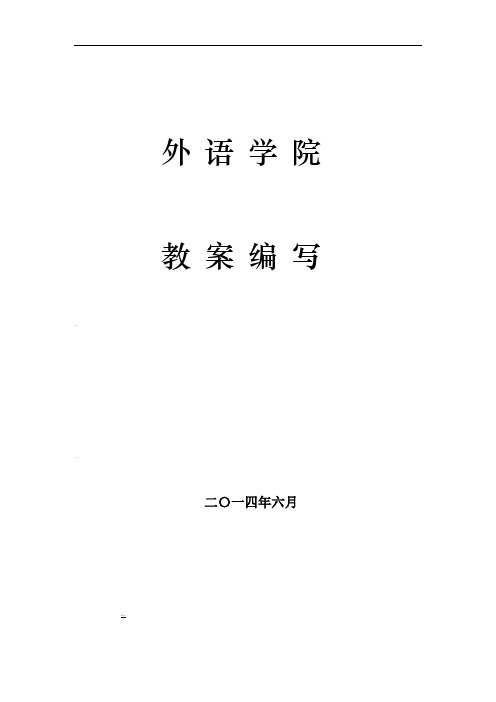
(=For a century we laboured to settle and to subdue the continent.)
`
警方设法制服了愤怒的人群。
教案(章节备课)
12学时
章节
Unit One Man and Nature
(
教学目的
和
教学要求
Learning Outcomes:
Students will be able to :
1. grasp the main idea and structure of the text;
2. appreciate the definition writing technique employed by the writer;
♦Exercise(AfterReading)
Time Allotment
@
♦Beforereading Activities1period (cultural background)
♦Global Reading2periods (Part Division of the Text;Further Understandingof the text)
|
cf. change, convert & transform
这些动词均有“变化,改变”之意。
change指任何变化,完全改变,强调与原先的情况有明显的不同。
convert指进行全部或局部改变以适应新的功能或用途。指信仰或态度时,强调较激烈、大的改变。
transform指人或物在形状、外观、形式、性质等方面发生的彻底变化,失去原状成为全新的东西。
新视野大学英语(第三版)读写教程Book-4-Unit-1教案
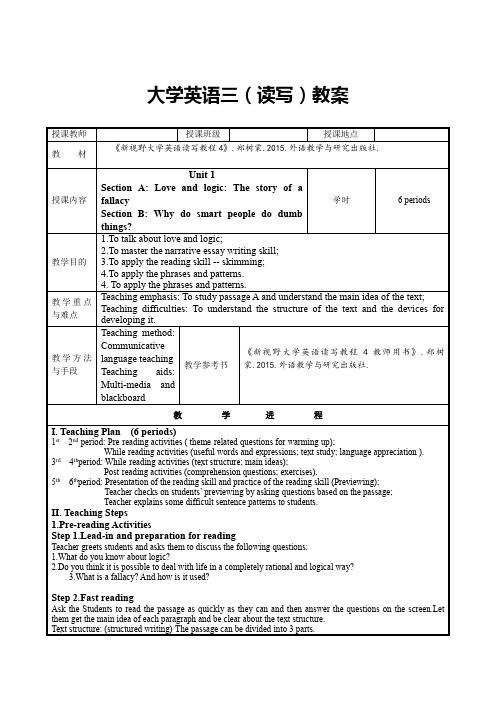
大学英语三(读写)教案10)ingenious a.good at inventing things and solving problems in new ways (人)有独创性的They are attacking the honest and ingenious scientist because his ideas are new.他们攻击这位诚实并富有独创能力的科学家, 是因为他的观点新颖。
2 .While-reading ActivitiesStep 4.Intensive readingStudents are asked to read the passage carefully again and answer some detailed questions on the screen.During the reading, there is an explanation for the following points:Language Points:1.That year every guy on campus had a leather jacket, and Rob couldn’t stand the idea of being the onlyfootball player who didn’t, so he made a pact that he’d give me his girl in exchange for my jacket.(Para.1)Meaning: That year every young man in the college wore a leather jacket.Rob was the only one in the football team who didn’t have one.He felt frustrated whenever he thought about it, so he made an agreement with me that if I gave him my leather jacket, he would, as an exchange, give me his girlfriend.2.make a pact: 达成协议in exchange for: 作为(对...的)交换3.If I could show the elite law firms I applied to that I had a radiant, well-spoken counterpart by my side, Ijust might edge past the competition.(Para.2)Meaning: When looking for a job, if I could show the top law companies that I had a partner who was not only beautiful but also intelligent and polite, I might well be able to gain an advantage over mycompetitors and successfully get a job offer.3. “Radiant”she was already.I could dispense her enough pearls of wisdom to make her “well-spoken”.(Para.3)Meaning: She was already very beautiful.And I could teach her to speak intelligently so that she would sound very pleasant and smart when she speaks.Meaning beyond words: The word “dispense”, which means “give sth.to people”, shows that the narratorregards himself far superior to the girl.He is again boasting and praising himself.The word shows hisarrogance and conceit.4.After a banner day out, I drove until we were situated under a big old oak tree on a hill off the expressway.(Para.4)Meaning: After spending an excellent day out with her, I drove my car to a hill by the highway.I stopped when we were under a big old oak tree.5.banner a.极好的;非常成功的n.横幅;横幅标语She seemed to have a good time.I could safely say my plan was underway.I took her home and set a date for another conversation.(Para.15)Meaning: It seemed that she had enjoyed my logic lesson very much.I was pretty sure that my plan was going on smoothly.I drove her home and decided on a date for our next meeting.underway 在进行中set a date for 为.....定日期 e.g.They will set a date for the wedding.6. “The situations are altogether different.You can’t make an analogy between them”.(Para.24)Meaning: The situations are totally different.You can’t make a comparison between them.Make/ draw an analogy between: 在.....之间作类比E.g.It is difficult to make an analogy between cars and airplanes.把汽车和飞机进行类比是很难的。
新视野大学英语读写教程第4册教案doc-新视野大学英语教案

课程名称:大学英语读写课授课对象:二年级全校公共课学生授课教师:职称:教材版本:《新视野大学英语﹒读写教程》第四册参考资料:教学光盘,教学参考书(外语教学与研究出版社)教学方法:计算机辅助多媒体教学手段授课。
(大班上课,小班辅导,上机自主学习)交际法与翻译法。
教学周次:4x18教学手段:多媒体教室,电子备课材料(移动硬盘),教材教学目标及要求:1.掌握每一单元的Section A中心思想、了解篇章结构,写作特点、文化背景知识。
2.掌握并背诵每一单元的Section A的核心词汇和短语、核心句型。
并能举一反三,熟练运用。
写出较通顺的短文。
3.自学Section B 和Section C 的内容。
4.课后自己做《新视野大学英语﹒综合练习》第四册Unit One (Book Four)Content of the CourseSection A. The Temptation of a Respectable Woman (精讲)Section B. The Obligations and Responsibilities to Marriage(略讲)Section C. The Positive Meanings of Love (泛读)AudienceTeaching Span6-7学时Teaching Aims1.Appreciate the text to know sth. about what happened between Mrs. Barodaand her husband’s friend.2. Learn to use some important words, expressions and sentence patterns.3. Practice listening, speaking, reading and writing.4. Learn some translation skillsInstruction Objectives &. Teaching ProceduresStep One Pre-reading Activities (导入)文章主题(Themes)10 minutes课文A向我们讲述了一位女性与她丈夫的一位生性沉默的朋友一起度过的一段时间,描写了她对这位朋友在感情上发生的变化。
大学英语听说教程4_Unit 4 原文+答案(智慧版)

A recent US study found that being close to nature might soothe the mind by reducing negative thoughts in the mind.
“Here's your prescription, walk in the forest five times a week for an hour.”
According to experts, it is expected that doctors will be giving
Scripts health advice like this in the not too distant future.
“‘Here's your prescription, walk in the forest five times a week for an hour.’ According to experts, it is expected that doctors will be giving health advice like this in the not too distant future.”
NEWS REPORT 1
Answers:
What health advice may doctors give in the future? 1 A. Walk in a forest.
新视野大学英语综合教程第四册综合教程4

Unit 1 book 4The Temptation of a Respectable WomanPeriod:2 periodsT eaching Objectives:1.Words, Phrases and Expressions of the Text ( stress on the word-formation, and the usage ofthe phrases and the expressions).2.Sentence Structure ( the usage of “might have done or could have done”; and “So +Subject+V or So + V +Subject”).3.Text Structure (story-writing in chronological order).T eaching Procedure:A. Pre-reading Activity(10minutes)What does it mean by the word “temptation” and “respectable”? What does it mean by the title “The Temptation of a Respectable Woman”? (Group work)B. While-reading Activity1.Ask students some sign post questions to each paragraph to see how well the studentsunderstand each paragraph. (Some of the questions are on P.8 Comprehension of the text)nguage Points: (refer to teachers’ book)1). Mrs. Baroda was a little annoyed to learn…Please note that “ annoyed: is modified by “ a little”. “ annoyed” can also be modified by other adverbs, like “ somewhat/ very/ a bit/ pretty/ much/rather/ quite”, etc.e.g. I was a bit annoyed, for I forgot to put your name on .2). … she could understand him no better than at first.Here “ no” mans “not at all”, and can be used as an adverb before comparatives.e.g. The exam is no more difficult than the tests you’ve been doing in class.3). … she imposed her company upon him,…impose one’s company/oneself/upon/on sb.; force one’s company or oneself on sb.e.g. Don’t impose your company/yourself on people who don’t like you.4)“ Y ou are full of surprises,” he said to her.Be full of surprises: do unexpected thingse.g. She’s always full of surprises.6). … the last thing he would desire or expect.The last thing: ( 1). sth. that is desired in the leaste.g. The last thing he needed right then was more bad news about his son.(2) sth. that is taken as the last onee.g. My feeling was that if this was the last thing I was going to do, I wanted to be ofsome value.7). But the poor fellow is run dow n by too much work now.Run down: (cause to) decline in physical condition; weaken or exhaust in mind or vigore.g. His health ran down to a dangerous level.…made some routine observations upon the unhealthy effect…8). …. A meaningless succession of verbs nouns, adverbs and adjectives…a succession of: a number of people or things following each other closelye.g. The reason is that a succession of statistics suggest a rapidly weakening economy.9). She wanted reach out her hand in the darkness and touch him ___ which she mighthave done if she had not been a respectable woman.Note the structure “might have done: is used to say that if a particular thing had happened, then there was a possibility of something else happening. The structure “could have done” can also be used in this way.e.g. She said it might have been all right, if the weather had been good.He could have got tickets if he had arrived there earlier.10). But she did not yield to the temptation.Yield to: give in to; decide to do sth. because one cannot resist the temptation.e.g. Plenty of mysteries have lasted for centuries and finally yielded to explanation.11). … she was also a very sensible one.sensible: reasonable, practical and able to judge things welle.g. I think it’s a very sensible suggestion.Compare: sensitive: (of people) easily upset, esp. by things that are said or done; (of things) causing people to be upset or producing a difficult or embarrassing situatione.g. Her reply showed that she was very sensitive to criticism.12). …truly he did not deserve it.Deserve:(not used in the progressive tenses) if sb,/sth. deserves sth., it is right that they should have it, because of the way they have behaved or because of what they aree.g. The report deserves careful consideration.One player in particular deserves a mention.He deserves to be locked up forever for what he did.C. Post-reading Activity1.Ask students to sum up the main idea of the text and to analyze the writing techniques of thetext.Text Structure AnalysisWriting in chronological order is common in narrative, where events are presented according to time sequence. This kind of writing is much used in telling stories, in brief biographical and autobiographical sketches. This reading passage is made up of several episodes arranged according to time sequence even though the author employs many different writing techniques, especially cause-and-effect in developing the episodes. Look at the following chart and you will find that the story is structured according to time sequence as a whole. 1. The first part o f the passage is Paragraph 1, which is the general situation of the story and also the starting point of the story. Mrs. Baroda was a little annoyed that her husband’s friend, Gouvernail, was to spend a week or two on their plantation. 2. The second part consists of 9 paragraphs, from Paragraph 2 to Paragraph 10, telling us what happened and informing us about Mrs. Baroda's impressions of her guest — Gouvernail. The descriptions are presented in chronological order. Paragraph 2 deals with Mrs. Baroda’s impression of her guest — she was feeling puzzled, not being able to penetrate her silent guest. Paragraphs 3 to 10 are about a conversation between Mr. and Mrs. Baroda concerning their guest —Gouvernail. Mrs. Baroda was troubled to find Gouvernail a terrible nuisance — not a man of wit, but a dull man difficult to understand. Time markers: after a few days, then, one day, in the morning, until, etc. 3. The third part is made up of 9 paragraphs,from Paragraph 11 to Paragraph 19, concentrating on what happened “that night”. The author uses a succession of verbs and adverbs to describe what happened that night in chronological order. In this part, the author also describes some sort of emotional change in Mrs. Baroda but all this came along with a succession of actions. Time markers: that night, the next morning, then, when, etc. 4. The fourth part is Paragraph 20 only. Paragraph 20 is about what happened the day after “that night”. The next morning, Mrs. Baroda took an e arly train without even saying farewell. She did not return until Gouvernail was gone. Time markers: the next morning, not return until 5. The fifth part is Paragraph 21. Paragraph 21 describes what happened during the time after “that night”. Durin g the summer that followed, Mr. Baroda greatly desired that his friend should come to visit them again but this was vigorously opposed by Mrs. Baroda. Time marker: during the summer that followed 6. The sixth part consists of Paragraph 22 to Paragraph 24, which is the continuing part of the story, still, according to time sequence. Before the year ended, Mrs. Baroda proposed to have Gouvernail visit them again as she had overcome everything. Time marker: before the year ended2.Homework: Learn the words and phrases by heart and next week there will be a dictation; Do all the exercises on the book with translation done on the exercise book.(2)Period:2 periodsT eaching Material:New Horizon College EnglishT eaching Procedure:1.Dictation of the words and phrasesment on and appraise the exercises.3.Reading Skills (Section B) The Obligations and Responsibilities to MarriageReading between the lines: using context clues, common sense and your knowledgeof the world to guess the possible answers to the questions between the paragraphs.1)Introduction of the skill (P. 16)2)Reading the samples ( P. 16)3)Practice the skill and (P.17)4)Doing the exercise on it (P.23)Note:There are three levels among the students. The students are given the tasks in terms of their levels.Unit 2, book 4Charlie Chaplin (Section A )Period:2 periodsT eaching Objectives:The students will be able to:T eaching Objectives1.Words, Phrases and Expressions of the Text ( stress on the word-formation, and theusage of the phrases and the expressions).2.Sentence Structure ( a: inversion of the sentence; b: It is + adj. to do…).3.Text Structure (a central topic/idea supported by different aspects/details).T eaching Procedure:A. Pre-reading Activity(10minutes)What do you know about Charlie Chaplin?What do you want to know about Charlie Chaplin? (Pair work)B. While-reading Activity1Ask students some sign post questions to each paragraph to see how well the students understand each paragraph and train Ss skimming ability. (Some of the questions are on P.37 Comprehension of the text)2Language Points: (refer to teachers’ book)1). cut down: reduce the size of (sth. such as clothing, writing, etc.)e.g.I could cut your father's trousers down for the boy.Y our article will have to be cut down to fit into the book.They've cut her hours down at work so she doesn't have much money.If an article is too long for the space allocated, you have to cut it down.2). . for good: permanently; forevere.g.This time she's leaving for good. 这一次她将是永远地离开了。
新视野大学英语unit_4听说教案

课时:2课时教学目标:1. 培养学生运用英语进行听说交流的能力,提高学生的口语表达能力。
2. 通过听说练习,使学生了解和掌握Unit 4的相关知识点,如旅游的目的、旅行中的注意事项等。
3. 培养学生的跨文化交际意识,提高学生的国际视野。
教学内容:1. 听力材料:Unit 4相关听力材料,包括旅游话题、旅行中的注意事项等。
2. 口语练习:围绕旅游话题进行口语对话,如旅行前的准备、旅行中的体验等。
教学步骤:第一课时:一、导入1. 教师简要介绍Unit 4的主题,引导学生了解旅游话题。
2. 学生分享自己曾经或计划中的旅行经历。
二、听力训练1. 学生听录音,了解旅游的目的和旅行中的注意事项。
2. 教师播放听力材料,学生边听边做笔记。
3. 教师提问,检查学生对听力材料的理解。
三、口语练习1. 学生两人一组,根据听力材料进行角色扮演,模拟旅行前的准备、旅行中的体验等场景。
2. 教师巡回指导,纠正学生的发音和语法错误。
四、总结与拓展1. 教师总结本节课的学习内容,强调重点和难点。
2. 学生分享自己的学习心得,提出问题。
3. 教师布置课后作业,要求学生预习Unit 4的阅读材料。
第二课时:一、复习1. 学生回顾上一节课的学习内容,教师提问检查。
2. 学生分享课后作业的完成情况。
二、口语练习1. 学生两人一组,根据预习的阅读材料进行口语对话,如讨论旅游的目的、旅行中的注意事项等。
2. 教师巡回指导,纠正学生的发音和语法错误。
三、角色扮演1. 学生分组,每组扮演不同角色,进行角色扮演练习。
2. 教师观察学生的表现,给予点评和指导。
四、总结与反馈1. 教师总结本节课的学习内容,强调重点和难点。
2. 学生分享自己的学习心得,提出问题。
3. 教师布置课后作业,要求学生预习下一单元的内容。
教学评价:1. 课堂表现:观察学生在课堂上的参与度、口语表达能力、合作意识等。
2. 课后作业:检查学生课后作业的完成情况,了解学生对知识的掌握程度。
明德大学英语unit4电子教案

课时:2课时教学目标:1. 理解课文内容,掌握重点词汇和句型。
2. 培养学生的阅读理解能力和口语表达能力。
3. 提高学生的跨文化交际意识。
教学重点:1. 课文内容理解2. 词汇和句型掌握3. 口语表达能力教学难点:1. 课文长句的理解2. 词汇的记忆和应用3. 口语表达的流利性和准确性教学过程:第一课时一、导入新课1. 引导学生回顾上节课的内容,检查学生的掌握情况。
2. 提出本节课的学习目标,让学生明确学习方向。
二、课文阅读1. 阅读课文,让学生了解文章大意。
2. 分析课文中的重点词汇和句型,讲解其用法。
3. 让学生朗读课文,注意语音、语调的准确性。
三、课堂讨论1. 提出与课文相关的问题,引导学生进行讨论。
2. 学生分组讨论,分享各自的观点。
3. 教师总结讨论结果,加深学生对课文内容的理解。
四、词汇练习1. 列举课文中的重点词汇,让学生造句。
2. 通过游戏、竞赛等形式,巩固学生对词汇的记忆。
五、课堂小结1. 回顾本节课所学内容,强调重点和难点。
2. 布置课后作业,巩固所学知识。
第二课时一、复习导入1. 复习上节课所学内容,检查学生的掌握情况。
2. 引导学生回顾课文中的重点词汇和句型。
二、口语表达1. 让学生根据课文内容,进行角色扮演。
2. 教师点评学生的口语表达,指出优点和不足。
3. 学生相互评价,共同提高。
三、语法讲解1. 分析课文中的语法结构,讲解其用法。
2. 让学生进行语法练习,巩固所学知识。
四、拓展阅读1. 引导学生阅读与课文内容相关的文章。
2. 让学生总结文章的主旨,提高阅读理解能力。
五、课堂小结1. 回顾本节课所学内容,强调重点和难点。
2. 布置课后作业,巩固所学知识。
教学反思:1. 关注学生的学习情况,及时调整教学策略。
2. 激发学生的学习兴趣,提高课堂氛围。
3. 注重学生的口语表达能力,培养学生的跨文化交际意识。
板书设计:一、导入新课1. 上节课回顾2. 本节课学习目标二、课文阅读1. 文章大意2. 重点词汇和句型三、课堂讨论1. 讨论问题2. 分组讨论3. 教师总结四、词汇练习1. 词汇造句2. 游戏竞赛五、课堂小结1. 重点和难点回顾2. 课后作业布置。
- 1、下载文档前请自行甄别文档内容的完整性,平台不提供额外的编辑、内容补充、找答案等附加服务。
- 2、"仅部分预览"的文档,不可在线预览部分如存在完整性等问题,可反馈申请退款(可完整预览的文档不适用该条件!)。
- 3、如文档侵犯您的权益,请联系客服反馈,我们会尽快为您处理(人工客服工作时间:9:00-18:30)。
To Lie or Not To Lie —The Doctor’s DilemmaSissela BokLanguage Points:1. dilemma: n. a difficult choice to be made between two opportunitiese.g. Y our proposal really put me in a dilemma.Collocation:on the horns of a dilemma进退维谷be in a dilemma 进退两难out of one’s dilemma 走出困境solve the dilemma摆脱困境1 Should doctors ever lie to benefit their patients —to speed recovery or to conceal the approach of death? In medicine as in law, government, and other lines of work, the requirements of honesty often seem dwarfed by greater needs: the need to shelter from brutal news or to uphold a promise of secrecy; to expose corruption or to promote the public interest.Notes:the requirements of honesty often seem dwarfed by greater needs: Here the author is pointing out that in a number of professions honesty or truthfulness frequently seems to be of less importance than other attributes.shelter from brutal news: protect others from the shocking /cruel truth.uphold a promise of secrecy: carry out a promise to keep sth. Secret.to expose corruption: (the need)to reveal or make known the dishonest or immortal behavior of those with power.to promote the public interest: Here the author may mean that certain types of information should be kept secret in order to protect the public interest.Comprehension Questions:1. What is the grammatical function of the sentence after the colon?… greater needs: the need …这里冒号后面的句子是前面great needs 的同位语。
2. Translate the sentence into Chinese.医疗行业与法律、政府及其他行业一样,往往对诚实与否的问题看得不那么重要。
相比之下要紧的倒是另外一些事情。
譬如,应设法避免可怕的消息造成的打击,或是考虑恪守保守秘密的诺言, 或是需要揭露腐败或促进公众利益。
Language Points:2. dwarf:(n.) a person, animal or plant of much less than the usual size(vt.) cause to appear small by comparisonExamples: The newly-built 40-story hotel dwarfs all the other buildings nearby.3. brutal:very cruelExamples: We have to face the brutal fact that Jim is going to die very soon.4. uphold: defend or support (a law, system, or principle)Examples: The law upholds everybody’s right to be fairly treated.5. expose: make knownExamples: The newspaper exposed the activities of the secret organization.6. promote: vt.1) help to develop and be successfulThe company is now promoting their new products on television.该公司正在电视上推销新产品。
2) raise in rank, or importanceThe football team was promoted to the first division.该足球队已晋升为甲级队。
2 What should doctors say, for example, to a 46-year-old man coming in for a routine physical checkup just before going on vacation with his family who, though he feels in perfect health, is found to have a form of cancer that will cause him to die within six months? Is it best to tell him the truth? If he asks, should the doctors deny that he is ill, or minimize (Notes: reduce to the smallest possible degree) the gravity of the illness? Should they at least conceal the truth until after the family vacation?Comprehension Questions:In this paragraph, the author uses four question marks. What does she want to tell us?She wants to show us the doctor’s dilemma whether to lie to such a patient or not.3 Doctors confront (Note:face)such choices often and urgently. At times (Notes: sometimes, once in a while), they see important reasons to lie for the patient’s own sake; in their eyes (Note: from one’s point of view), such lies differ sharply from self-serving ones (Note: such lies are clearly or distinctly different from the lies that serve one’s own interest).4 Studies show that most doctors sincerely believe that the seriously ill do no t want to know the truth about their condition, and that informing them risks destroying their hope, so that they may recover (Note: get well, strong, etc. again)more slowly, or deteriorate faster, perhaps even commit suicide. As one physician wrote: “Ours is a profession which traditionally has been guided by a precept that transcends the virtue of uttering the truth for truth’s sake, and that is ‘as far as possible do no harm.’”Comprehension Questions:1. Paraphrase this long sentence.“We doctors have long been guided by a principle that is above the morality of telling the truth as an end in itself and that principle is that we must try our best not to do our patients any harm.”2. Translate the sentence into Chinese.正如一位内科医生写到:“我们这个职业传统上恪守一个信条,那就是:‘尽量不造成伤害’,这一信条胜过为讲真话而讲真话的美德”。
5 Armed with such a precept, a number of doctors may slip into deceptive practices that they assume will “do no harm”and may well help their patients. They may prescribe innumerable placebos, sound more encouraging than the facts warrant, and distort grave (Note: serious) news, especially to the incurably ill and the dying. Comprehension Questions:1. Paraphrase the sentence.They may say some words that are more encouraging than the patients ’ real state deserves and give a false or misleading account of the seriousness of their condition. This happens especially to the incurably ill and the dying patients.2. Translate the sentence into Chinese.他们可能开出无数贴安慰剂,说一些没有事实根据的话为病人打气,歪曲严重的病情,对那些患有不治之症和濒临死亡的病人,则尤其如此。
